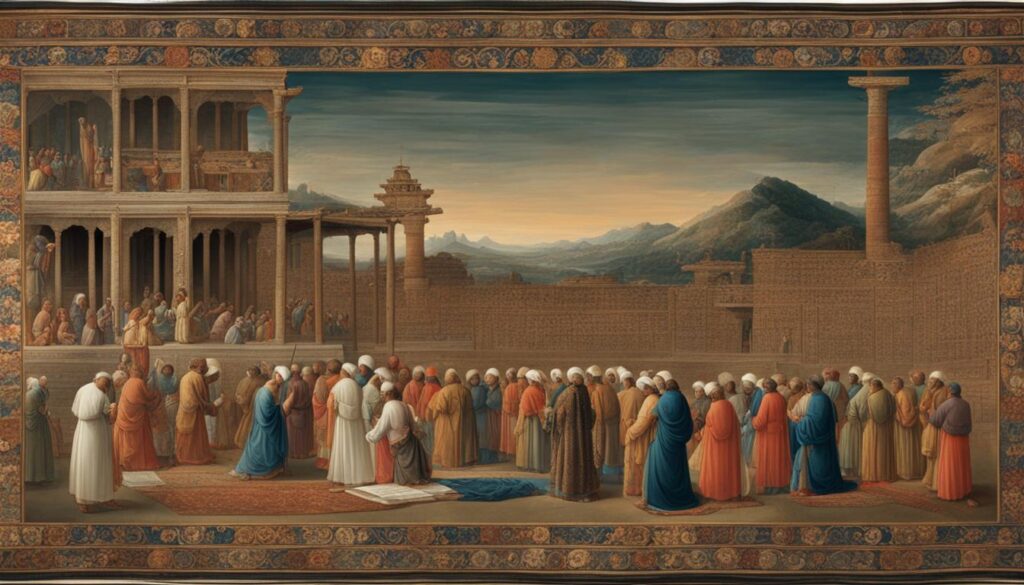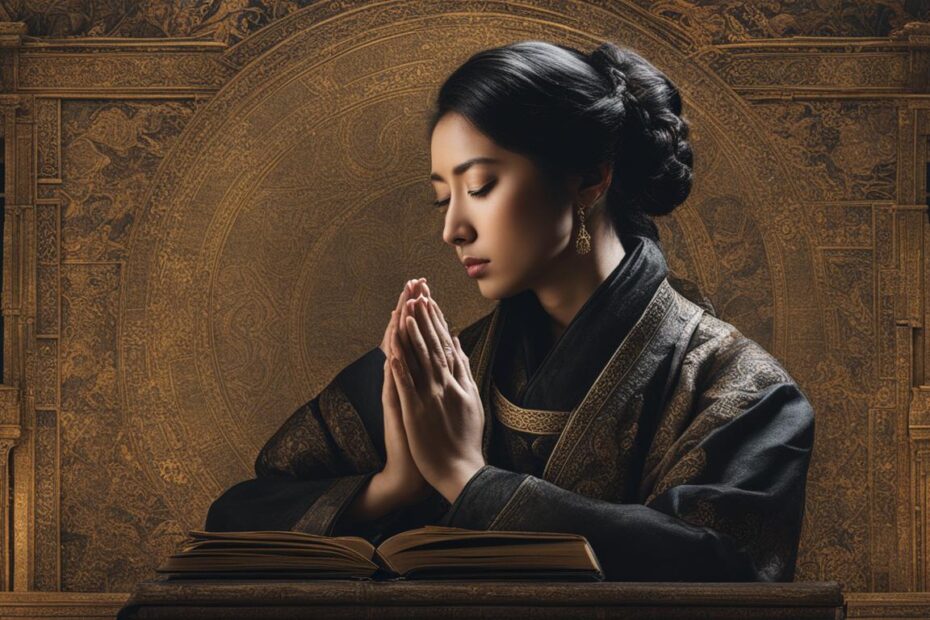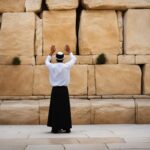Prayer has played a significant role throughout history, with numerous references to prayer in the Bible and the book of Acts alone. The early church was deeply devoted to prayer, and they recognized its power as they witnessed the filling of the Holy Spirit, healings, bold preaching, and comfort for persecuted believers through prayer. The disciples set a strong example of discipline and devotion to prayer, both in the temple and in their daily lives. Prayer was considered essential for their relationship with God and the effectiveness of their mission.
Key Takeaways:
- Prayer has had a significant impact on history, as seen in the Bible and the book of Acts.
- The early church emphasized the importance of prayer for spiritual experiences and carrying out their mission.
- Discipline and devotion to prayer were demonstrated by the disciples in their daily lives.
The Beginnings of Prayer in Human History
According to historical accounts and biblical tradition, prayer has been a fundamental part of human history since ancient times. As depicted in the story of Adam and Eve, prayer emerged as a way for humans to connect with God after being cast out of the Garden of Eden. This sacred practice has continued throughout the ages, with individuals and civilizations seeking spiritual guidance, solace, and transformation through prayer.
In their book “Prayer: A History,” the Zaleskis argue that prayer should be taken seriously as a fundamental aspect of human interaction with the divine. They challenge reductionist arguments that dismiss prayer as a mere cultural appendix, emphasizing that prayer has the power to bring about positive change in the world. This historical perspective highlights the significance of prayer as a timeless practice that transcends cultural and religious boundaries.
Prayer, as an integral part of human history, has evolved and taken different forms. It has been a way for individuals to express their needs, seek forgiveness, give thanks, and make requests. Various cultures and religions have developed their own rituals and traditions surrounding prayer, with different modes of prayer emphasizing aspects such as magic, sacrifice, and devotion. These diverse expressions of prayer reflect the depth and complexity of human spirituality throughout history.
The Power of Prayer in Historical Context
“Prayer is not asking. It is a longing of the soul. It is daily admission of one’s weakness. It is better in prayer to have a heart without words than words without a heart.” – Mahatma Gandhi
The historical accounts of prayer reveal its profound impact on individuals and societies. Prayer has been a source of comfort in times of hardship, a catalyst for spiritual growth, and a means of seeking guidance and wisdom. While prayer does not guarantee that every request will be fulfilled according to our desires, it provides a channel for connecting with the divine and aligning our hearts with God’s will. Through prayer, individuals have found solace, strength, and the resilience to navigate the complexities of life.
| Key Aspects of Prayer in History | Significance |
|---|---|
| Connection with the Divine | Prayer has allowed humans to commune with God and establish a sacred link between the earthly and the heavenly realms. |
| Spiritual Guidance | Prayer has provided individuals with guidance, wisdom, and a sense of direction in their personal and communal lives. |
| Transformation and Growth | Through prayer, individuals have experienced personal transformation, growth in faith, and a deeper understanding of themselves and the world around them. |
| Intercession and Empathy | Prayer has fostered empathy and intercession, allowing individuals to lift up the needs of others and seek God’s intervention on their behalf. |
As we explore the historical accounts of prayer, we gain a deeper appreciation for its enduring relevance and the profound impact it has had on individuals, communities, and the course of history itself.
The Different Modes of Prayer
Throughout history, prayer has taken on various modes and forms, each carrying its own significance and purpose. The Zaleskis, in their influential book “Prayer: A History,” shed light on the diverse archetypes of prayer and explore the magical and sacrificial dimensions inherent in these practices.
Magic and the Power of Words
The intertwining of magic and prayer has been a recurring theme in history. In many cultures, prayer was seen as a means of tapping into supernatural forces and harnessing their power. The Zaleskis emphasize the belief in the transformative abilities of prayer and how it can impact the world around us.
“Prayer is not a mere cultural appendix. It has the potential to bring about positive change by aligning our intentions with the divine.”
The Sacrifice of Prayer
Another mode of prayer highlighted by the Zaleskis is sacrificial prayer. This form of prayer focuses on surrendering oneself and undergoing personal transformation. It involves letting go of personal desires and aligning one’s will with the divine. Sacrificial prayer seeks not only personal growth but also the greater good of humanity.
Prayer Across Cultures and Religions
Prayer takes on various forms across different cultures and religions, reflecting the diverse spiritual practices found worldwide. The authors explore the prayer of the refugee, a prayer seeking solace and aid from a higher power during times of distress. Additionally, they delve into the prayer of the devotee, a cyclical and regular practice that fosters a deep connection with the divine.
These different modes of prayer have traversed time, cultures, and religions, demonstrating the universal human need for spiritual connection and guidance.

The Practice of Prayer
Prayer is a deeply personal and diverse practice that has existed throughout history, holding both individual and communal significance. The ways in which prayer is practiced can vary greatly, allowing individuals to connect with the divine in a manner that aligns with their beliefs and needs.
The Importance of Personalization
One of the key aspects of prayer is its ability to be personalized. From the choice of words to the preferred mode of communication, individuals have the freedom to tailor their prayers according to their unique circumstances and relationship with the divine. Some may find solace in traditional prayers handed down through generations, while others may opt for spontaneous and heartfelt expressions of faith. The act of personalizing prayer enables individuals to feel a deeper connection to their spiritual beliefs and fosters a sense of intimacy with the divine.
The Role of Ritual and Community
Prayer is not solely an individual practice but is often embraced within a communal context. Rituals and group prayers allow individuals to come together, strengthening their sense of belonging and shared purpose. These collective experiences can create a powerful sense of unity and support, reinforcing the historical significance of prayer as a unifying force within communities. Moreover, engaging in prayer as a community can serve as a source of encouragement, inspiration, and accountability, as individuals rally together to seek guidance and transformation.
| Prayer Practices | Benefits |
|---|---|
| Individual prayer | Offers personal reflection and guidance |
| Group prayer | Fosters a sense of community and support |
| Prayer rituals | Deepens connection with spiritual traditions |
| Silent prayer | Aids in introspection and mindfulness |
Relevance in Historical Context
The practice of prayer has survived the test of time and remains relevant in various historical contexts. Throughout history, individuals and communities have turned to prayer during times of distress, seeking solace and guidance. The act of prayer has provided a way for people to express their hopes, fears, and gratitude to a higher power, transcending cultural and religious boundaries. The historical reflections on prayer demonstrate its enduring significance and its ability to provide comfort, strength, and a sense of purpose to those who engage in it.
As we explore the historical significance of prayer, it becomes evident that this practice has been a source of inspiration and transformation for countless individuals across different cultures and religions. The power of prayer lies not only in its ability to effect change but also in its capacity to foster a deeper connection with the divine and with others who share in the faith. Whether practiced individually or in a communal setting, prayer continues to be a timeless and valuable spiritual practice.
The Power and Mystery of Prayer
Prayer has a deep significance in history, spanning across different cultures and religions. It has been a way for humans to connect with the divine, seek guidance, and find solace. Throughout history, prayer has been a central practice for individuals and communities, serving as a source of strength and hope.
One of the remarkable elements of prayer is its power to bring about change. Although not every prayer may be answered in the way we desire, Christians believe that prayer is a means of communication with God, and that He hears their prayers. The mystery lies in trusting that God’s response may not always align with our expectations. Sometimes the answer may be “no” or “not yet.” This reflects a recognition that God’s wisdom surpasses human understanding and that He knows what is best for us.
“Prayer is not asking. It is a longing of the soul. It is daily admission of one’s weakness. It is better in prayer to have a heart without words than words without a heart.” – Mahatma Gandhi
In the face of adversity, historical reflections on prayer reveal countless stories of individuals finding strength and comfort through their faith. Prayer has been a powerful source of inspiration for social justice movements, providing a sense of unity and purpose. It has been a driving force behind historical figures who sought to bring about positive change in their communities.
| Time Period | Significance |
|---|---|
| Ancient Egypt | The Egyptians believed in the power of prayer to appease their gods and ensure prosperity. |
| Medieval Europe | Prayer played a critical role in the daily lives of medieval Christians, connecting them to God and seeking divine intervention in various aspects of life. |
| American Civil Rights Movement | Prayer served as a guiding force for civil rights activists who sought justice and equality, providing them with strength and resilience in the face of adversity. |
| World War II | Soldiers and civilians turned to prayer for comfort, protection, and guidance during the turmoil of war. |
As we reflect on the significance of prayer in history, we are reminded of its enduring power and the role it has played in shaping societies and cultures. It is a practice that allows individuals to express their needs and hopes, seek guidance, and experience a deeper connection with the divine. Prayer continues to be a source of strength, comfort, and transformation for people around the world.
Conclusion
Throughout history, prayer has played a vital role in shaping the lives of individuals and communities. It has been a source of solace in times of distress, a guide for decision-making, and a catalyst for personal transformation. As we reflect on the historical significance of prayer, we recognize its enduring relevance in our lives today.
From the early days of the church, where the disciples fervently devoted themselves to prayer, to the diverse modes of prayer practiced across cultures and religions, prayer has bridged the gap between humanity and divinity. It has served as a powerful tool for communication and communion with God.
As we examine the historical reflections on prayer, we discover that it is not a guarantee for immediate fulfillment of our desires. Instead, prayer invites us to surrender our will to a higher wisdom and trust in a divine plan that surpasses our understanding. Through prayer, we find comfort, guidance, and a deep connection with the divine.
Today, the role of prayer in history continues to shape our lives. As we engage in this timeless practice, we tap into the power and mystery of prayer, seeking personal transformation and contributing to the spiritual tapestry of humanity. Let us embrace the historical significance of prayer and allow it to guide our hearts and minds in the pursuit of a deeper connection with God.
FAQ
What role does prayer play in history?
Prayer has played a significant role throughout history, as it has been a source of comfort, guidance, and transformation for individuals and communities.
How far back does prayer go in human history?
Prayer dates back to the time of Adam and Eve, who prayed after being cast out of the Garden of Eden. It has been a fundamental aspect of human interaction with the divine since then.
What are the different modes of prayer?
Prayer can take various forms, including magical prayer that acknowledges the power in words and actions, sacrificial prayer that focuses on surrender and self-transformation, and prayers specific to different situations and religious practices.
How can prayer be practiced?
Prayer can be practiced individually or with others, silently or out loud, using prepared prayers or personal words. It is important to find a time and place that allows for focused communication with God.
Does prayer guarantee that all requests will be fulfilled?
While prayer is a means of communicating with God, it does not guarantee that every request will be fulfilled in the way we desire. God sees the bigger picture and knows what is best for us, even when we don’t understand.
What is the power and mystery of prayer?
Prayer is a spiritual practice that allows individuals to express their needs, seek guidance, and experience a deeper connection with God. It has the power to bring about positive change in individuals and the world.









